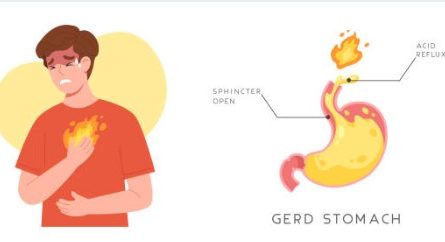There are several over-the-counter (OTC) medications available for the treatment of acid reflux. These medications can provide relief from symptoms such as heartburn, indigestion, and acid regurgitation. Here are some commonly used OTC options.
Antacids work by neutralizing stomach acid and providing temporary relief from acid reflux symptoms. Examples include Tums, Rolaids, Maalox, and Mylanta. Antacids are typically available in tablet or liquid form.
Rolaids Antacid Calcium & Magnesium Supplement Ultra Strength Tablets, Fruit 72 ea (Pack of 4)
H2 blockers (Histamine-2 receptor antagonists)
H2 blockers reduce the production of stomach acid, offering longer-lasting relief compared to antacids. Examples of OTC H2 blockers include ranitidine (Zantac 75) and famotidine (Pepcid AC). These medications come in tablet or chewable tablet form.
Pepcid AC Tablets Original Strength 90 Tablets (Pack of 2)
Proton pump inhibitors (PPIs)
PPIs are more potent acid reducers that effectively inhibit stomach acid production. Omeprazole (Prilosec OTC), lansoprazole (Prevacid 24HR), and esomeprazole (Nexium 24HR) are some OTC PPI options. These medications are usually taken once daily in the form of delayed-release capsules or tablets.
Nexium 24HR ClearMinis Acid Reducer Heartburn Relief Delayed Release Capsules
It’s important to read and follow the instructions on the product packaging or consult with a pharmacist to ensure proper usage and dosing. While OTC medications can provide temporary relief, it’s essential to consult with a healthcare professional if you have persistent or severe symptoms, or if over-the-counter treatments do not adequately manage your acid reflux. They can provide a proper diagnosis and recommend appropriate treatment options based on your specific needs.
How to Diagnose Acid Reflux
The diagnosis of acid reflux typically involves a combination of a medical history evaluation, symptom assessment, and, in some cases, additional diagnostic tests. Here are the steps commonly taken to diagnose acid reflux.
Medical history and symptom assessment
Your healthcare provider will begin by discussing your symptoms and medical history. They will ask you about the nature and frequency of your symptoms, triggers that worsen or alleviate symptoms, and any other relevant information.
Physical examination
A physical examination may be performed to assess your overall health and look for any signs of complications related to acid reflux.
Trial of lifestyle modifications and over-the-counter treatments
In some cases, your healthcare provider may recommend trying lifestyle modifications (such as dietary changes and elevating the head of the bed) and over-the-counter medications to see if they alleviate your symptoms.
Response to medication
If lifestyle modifications and over-the-counter treatments do not sufficiently relieve your symptoms, your healthcare provider may prescribe acid-reducing medications, such as H2 blockers or proton pump inhibitors (PPIs), for a specified period. They will assess how well you respond to the medication and whether your symptoms improve.
Additional diagnostic tests
If your symptoms persist or if your healthcare provider suspects complications or a more severe form of acid reflux (such as GERD), they may recommend further diagnostic tests, such as:
Upper endoscopy
This procedure involves inserting a flexible tube with a camera (endoscope) into your throat and esophagus to visually examine the lining and look for any abnormalities.
Esophageal pH monitoring
This test measures the amount of acid in your esophagus over a 24-hour period. It can help determine the frequency and duration of acid reflux episodes.
Esophageal manometry
This test measures the strength and coordination of the muscles in your esophagus to assess their function and rule out any motility disorders.
Barium swallow
In this test, you will drink a contrast material (barium) that coats the lining of your esophagus and stomach. X-rays are then taken to evaluate the structure and movement of these organs.
These diagnostic tests help your healthcare provider confirm the presence of acid reflux, assess its severity, and rule out other potential causes of your symptoms.
It’s important to consult with a healthcare professional for an accurate diagnosis and to discuss the most appropriate diagnostic tests and treatment options for your specific situation. They can provide personalized guidance based on your symptoms, medical history, and the results of any diagnostic tests conducted.
Symptoms of Acid Reflux
Acid reflux, also known as gastroesophageal reflux (GER), typically manifests through a range of symptoms that can vary in severity and frequency from person to person. Here are common symptoms associated with acid reflux:
Heartburn – A burning sensation or discomfort that starts in the chest and may radiate upward towards the throat. It often occurs after eating and can worsen when lying down or bending over.
Regurgitation – The sensation of acid or food coming back up into the throat or mouth. It may be accompanied by a sour or bitter taste.
Chest pain – Some individuals may experience chest pain that can mimic the symptoms of a heart attack. It is important to differentiate between acid reflux-related chest pain and heart-related chest pain, as they require different treatments.
Difficulty swallowing (dysphagia)
Acid reflux can cause narrowing of the esophagus or irritation of the throat, leading to a sensation of food getting stuck or difficulty swallowing.
Chronic cough
A persistent cough that is often worse at night and may be accompanied by hoarseness or a tickling sensation in the throat. The cough is usually dry and not productive.
Sore throat
Acid reflux can irritate the throat, leading to a persistent sore or scratchy throat.
Laryngitis
Inflammation of the vocal cords, resulting in hoarseness, voice changes, or loss of voice.
Excessive saliva production
Some individuals may experience increased saliva production, often in response to the irritation caused by acid reflux.
It’s important to note that not everyone with acid reflux experiences all of these symptoms. Some individuals may only have mild symptoms or occasional flare-ups, while others may have more frequent and severe symptoms. If you experience persistent or bothersome symptoms, it’s advisable to consult with a healthcare professional for an accurate diagnosis and appropriate treatment. They can help determine the underlying cause of your symptoms and recommend an individualized management plan.











